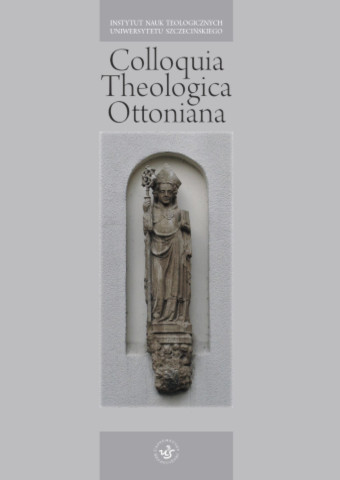ISSN: 1731-0555
eISSN: 2353-2998
OAI
DOI: 10.18276/cto





General Information
The annual journal Colloquia Theologica Ottoniana (CTO) is edited by the Institute of Theology of the University of Szczecin. The journal is mainly comprised of original scientific manuscripts in Polish or English language and on the following topics: theology, canon law, philosophy, ethics, psychology, pedagogy, and sociology. Apart from these topics, CTO presents polemics, critical reviews of recently published books, and reports on momentous scientific events.
The CTO journal is registered in the following indexes:
- Central European Journal of Social Sciences and Humanities (CEJSH)
- Central and Eastern European Online Library (CEEOL)
- DOAJ: Directory of Open Access Journals
- ERIH PLUS: European Reference Index for the Humanities and Social Sciences
- Index Copernicus International (ICI)
- BazHum
- Theo-logos
- Crossref
Submission of manuscripts are invited on a continuous basis. CTO is available in both print and digital forms. The digital version is available through the Szczecin University Press website. We kindly invite all interested parties to submit papers within the scientific disciplines promoted by CTO, and we will strive to maintain the highest publishing standards.
History of CTO
From 1991–2000, the periodical Szczecin Ecclesial Studies was published under the auspices of the Archbishop Seminary of Theology in Szczecin. On July 1, 2001, this series continued as the CTO with a connection to the commencement of the Faculty of Theology at the University of Szczecin. Since its establishment, CTO was published within the Theological Seminary of Szczecin which was then affiliated to the Faculty of Theology of the Adam Mickiewicz University in Poznan.
In Warsaw on January 9, 2004, the Government of the Republic of Poland and the Conference of Polish Episcopate agreed on the establishment and practice of the Faculty of Theology of the University of Szczecin. CTO promptly became an important feature of the newly established faculty and inspired them to carry out rigorous research work.
The first three issues of CTO were published annually; however, between 2004–2019, the journal was biannual. Since 2020, CTO has been published again as an annual journal.
The first editor-in-chief of CTO was Professor Piotr Briks, PhD (2001–2007), from the University of Szczecin. In 2008, he was succeeded by Professor Grzegorz Wejman, PhD (2008–2019), also from the University of Szczecin.
The Patron Saint of the Colloquia Theologica Ottoniana
The journal’s patron is Saint Otto von Bamberg (1060–1139). He was a bishop whose apostolic work was connected with the geographical areas currently covered in the scientific research of the University of Szczecin. Otto von Bamberg was born in approximately 1060 in Franconia. He arrived in Poland in 1080 while assisting Heinrich von Wülzburg, the later Archbishop of Gniezno. In 1088, Otto entered the court of Duke Władysław I Herman in Płock.
On Otto’s return to Germany, he became the chaplain and court chancellor of the emperor Heinrich IV and was ordained a bishop of Bamberg in 1102. Otto was an able administrator and a committed priest who made a name for himself by establishing numerous monasteries. Otto was merited thereafter as the “Father of the Monks.”
He returned to Poland in 1124 at the invitation of Duke Bolesław III Krzywousty. Through Wroclaw, Kalisz, and Gniezno, he reached West Pomerania where he commenced his evangelistic mission. On his way to Pyrzyce, he met the Pomeranian Duke Warcisław I. In Pyrzyce, Otto was received with great enthusiasm which resulted in a mass baptism of people inhabiting Pomerania. Approximately seven thousand Pomeranians are said to have been baptized within twenty days of Otto’s preaching. A similar situation also occurred in Kamień Pomorski. Only in Wolin was Otto met with disapproval. He was beaten and forced to leave the city. He left for Szczecin where he found new Christians. Many of these people were probably motivated to be baptized out of fear of repercussions by Duke Bolesław Krzywousty.
Otto von Bamberg was a talented scholar who spoke Polish very well. His two mission journeys resulted in combining the religious and moral instructions he directed at the Pomeranians. He also banned cruel heathen customs widely practiced within the region. Upon the completion of his mission in Pomerania, the bishop returned to Bamberg where he died in 1139. In 1189, he was canonized by Pope Clemens III. Saint Otto is the patron of the Pomeranian city of Pyrzyce, the Archdioceses of Szczecin-Kamień Pomorski, Bamberg, as well as Berlin.
Saint Otto was elected the patron of our journal because he was not only a good and wise man, but he was also a committed priest seeking truth. Reaching the truth has always been perceived as the most valuable and precious aim of scientific research. This aim is also consistent with the Plato and Aristotle’s concept of science where the satisfaction of acquiring knowledge is deemed as the researcher’s highest award—scire propter scire (to know for the sake of knowing).
